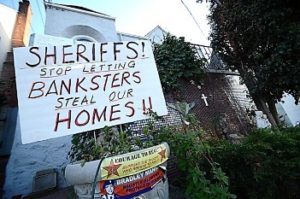Finance capitalism vs Industrial capitalism
Michael Hudson
Alliance of Banks with Industry to Promote Reform
The capitalism of Marx’s day contained many survivals from feudalism, most notably a hereditary landlord class living off the land rents, most of which were spent unproductively on servants and luxuries, not to make a profit. These rents had originated in a tax. Twenty years after the Norman Conquest, King William 1 ordered the compilation of the Domesday Book to calculate the yield that could be extracted as taxes from the land that he and his companions had seized. As a result of King John’s overbearing fiscal demands, the Revolt of the Barons (1215-17) together with their Magna Carta enabled the leading warlords to obtain much of this rent for themselves. Karl Marx explained that industrial capitalism was politically radical in seeking to free itself from the burden of having to support this privileged landlord class, receiving income with no basis in cost value or enterprise of its own.
Industrialists sought to win markets by cutting costs below those of their competitors. That aim required freeing the entire economy from the “faux frais” of production – the socially unnecessary charges built into the cost of living and doing business. Classical economic rent was defined as the excess of price above intrinsic cost-value, the latter being ultimately reducible to labour costs. Productive labour was defined as that employed to create a profit, in contrast to the servants and retainers (coachmen, butlers, cooks, et al.) on whom landlords spent much of their rent.
The paradigmatic form of economic rent was the ground rent paid to Europe’s hereditary aristocracy. As John Stuart Mill explained, landlords reaped rents (and rising land prices) “in their sleep.” Ricardo had pointed out (in Ch 2 of his 1817 Principles of Political Economy and Taxation) a kindred form of differential rent in natural-resource rent that stemmed from the ability of mines with high-quality ore bodies to sell their lower-cost mineral output at prices set by high-cost mines. Finally, there was monopoly rent paid to owners at choke points in the economy where they could extract rents without a basis in any cost outlay. Such rents logically included financial interest, fees and penalties.
Marx saw the capitalist ideal as freeing economies from the landlord class that controlled the House of Lords in Britain, and similar upper legislative houses in other countries. That aim required political reform of Parliament in Britain, and ultimately the formation of the House of Commons, so as to prevent landlords from protecting their special interests at the expense of Britain’s industrial economy. The first great battle in this fight against the landed interest was won in 1846 with repeal of the Corn Laws. The fight to limit landlord power culminated in the constitutional crisis of 1909-10, when the Lords rejected the land tax imposed by the Commons. The crisis was resolved by a ruling that the Lords never again could reject a revenue bill passed by the House of Commons.
Banks oppose Real Estate, 1815-46
It may seem ironic today that Britain’s banking sector was whole-heartedly behind the first great fight to minimize land-rent. That alliance occurred after the Napoleonic Wars ended in 1815, which terminated the French blockage against British seaborne trade and re- opened the British market to lower- priced grain imports. British landlords demanded tariff protection under the Corn Laws – to raise the price of food, in order to increase their revenue and hence the capitalized rental value of their landholdings – but that has render- ed the economy high-cost.
A successful capitalist economy would have to minimize these costs in order to win foreign markets and indeed, to defend its own home market. The classical idea of a free market was one free from economic rent – from rentier income in the form of land rent.
This rent – a quasi-tax paid to the heirs of the warlord bands that had conquer- ed Britain in 1066, and the Viking bands that had conquered other European realms – threatened to minimize foreign trade. That was a threat to Europe’s banking classes, whose major market was the funding of commerce by bills of exchange.
The banking class arose as Europe’s economy was revived by the vast looting of bullion from Constantinople by the Crusaders. Bankers were permitted a loophole to avoid Christianity’s banning of the charging of interest, by taking their return in the form of agio, a fee for transferring money from one currency to another, including from one country to another.
Even domestic credit could use the loophole of “dry exchange”, charging agio on domestic transactions cloaked as a foreign-currency transfer, much as modern corporations make use of the “offshore banking centres” today to pretend that they actually earn their income in tax-avoidance countries that do not impose any income tax.
If Britain was to become the industrial workshop of the world, it would prove highly beneficial to Ricardo’s banking class (he was its Parliamentary spokes- man; today we would describe him as a lobbyist). Britain would enjoy an inter- national division of labour in which it exported manufactures and imported food and raw materials from other countries specializing in primary commodities and depending upon Britain for their industrial products. But for this division to happen, Britain needed a low price of labour. That meant having low costs for food, which at that time were the largest items in the family budgets of waged labour. That in turn required ending the power of the landlord class to protect its “free lunch” of land rent, and all the recipients of such “unearned income.”
It is hard today to imagine industrialists and bankers hand in hand promoting democratic reform against the aristocracy. But that alliance was needed in the early 19th century. And of course, democratic reform at that time extended only to the extent of unseating the land- lord class, not protecting the interest of labour. The hollowness of the democratic rhetoric of the industrial and banking class became apparent in Europe’s 1848 revolutions, where the vested interests ganged up against extending democracy to the population at large, once the latter had helped end landlord protection of its rents.
It was the socialists who picked up the political fight after 1848. Karl Marx later reminded a correspondent that the first plank of the Communist Manifesto was to socialize land rent, but poked fun at the “free market” rent critics who refused to recognize that rentier-like exploitation existed in industrial employment of wage labor. Just as landlords obtain- ed land rent in excess of the cost of
producing their crops (or renting out housing), so employers obtained profits by selling the products of wage-labour at a markup. To Marx, that made industrialists part of the rentier class in principle, notwithstanding that the economic system of industrial capitalism was very different from that of post-feudal rentiers, landlords and bankers.
The Alliance of Banking with Real Estate
With this background of how industrial capitalism was evolving in Marx’s day, we can see how overly optimistic he was regarding the drive by industrialists to strip away all unnecessary costs of production – all charges that added to price without adding to value. In that sense he was fully in tune with the classical concept of free markets, as markets free from land rent and other forms of rentier income.
Today’s mainstream economics has reversed this concept. In an Orwellian doublethink twist, the vested interests today define a free market as one “free” for the proliferation of various forms of land rent, even to the point of giving special tax advantages to absentee real estate investment, the oil and mining industries (natural-resource rent), and most of all to high finance (the accounting fiction of “carried interest”, an obscure term for short-term arbitrage speculation).
Today’s world has indeed freed economies from the burden of hereditary ground rent. Almost two-thirds of U.S. families own their own homes (although the rate of home ownership has been falling steadily since the Great Obama Evictions that were a by-product of the junk-mortgage crisis and Obama Bank Bailouts of 2009-16, which lowered the homeowner rates from over 68% to
62%). In Europe, home ownership rates have reached 80% in Scandinavia, and high homeowner rates characterize the entire continent. Home ownership – and also the opportunity to purchase commercial real estate – has indeed become democratized.
But it has been democratized on credit. That is the only way for wage-earners to obtain housing, because otherwise they would have to spend their entire working life saving enough to buy a home. After World War II ended, banks provided the credit to purchase homes (and for speculators to buy commercial properties) by providing mortgage credit to be paid off over the course of thirty years, the likely working life of the young home buyer

Real estate is by far the largest market of the banking sector. Mortgage lending accounts for about 80% of all U.S. and British bank credit. It played a minor role back in 1815, when banks focused on financing commerce and international trade. But today we can speak of the
Finance, Insurance and Real Estate (FIRE) sector as being the economy’s dominant rentier sector. This alliance of banking with real estate has led banks to become the major lobbyists protecting real estate owners by opposing the land tax that seemed to be the wave of the future in 1848 in the face of rising advocacy to tax away the land’s entire price gains and rent, to make land the tax base as Adam Smith had urged, instead of taxing labour and consumers or profits. Indeed, when U.S. income tax began to be levied in 1914, it fell only on the wealthiest 1% of Americans, whose taxable income consisted almost entirely of property and financial claims.
The past century has reversed that tax philosophy. On a national level, real estate has paid almost zero income tax since World War II, thanks to two give-aways. The first is “fictitious depreciation,” sometimes called over-depreciation. Landlords can pretend that their buildings are losing value by claiming that they are wearing out at fictitiously high rates (that is why Donald Trump said that he loves depreciation). But by far the largest giveaway is that interest payments are tax deductible. It is a fact that Real estate is taxed locally, typically at only 1% of assessed valuation, which is less than 7-10% of the actual land rent.

The basic reason why banks support tax favouritism for landlords is that whatever the tax collector relinquishes is available to be paid as interest. Mortgage bankers always end up with the major proportion of land rent within the
U.S. When a property is put up for sale and homeowners bid against each other to buy it, the equilibrium point is where the winner is willing to pay the full rental value to the banker to obtain a mortgage. Commercial investors are also usually willing to pay the entire rental income to obtain a mortgage, because they are after the “capital” gain – that is, the rise in the land’s price.
The policy position of the so-called Ricardian socialists in Britain and their counterparts in France (Proudhon, et al.) was for the state to collect land’s economic rent as its major source of revenue. But today’s “capital” gains occur primarily in real estate and finance, and are virtually tax-free for land- lords. Owners pay no capital-gains tax as real estate prices rise, or even upon sale if they use their gains to buy another property. And when landlords die, all tax liability is wiped out.
The oil and mining industries likewise are notoriously exempt from income taxation on their natural-resource rents. For a long time the depletion allowance allowed them tax credit for the oil that was sold off, enabling them to buy new oil-producing properties (or whatever they wanted) with their supposed asset loss, defined as the value to recover whatever they had emptied out. There was no real loss, of course. Oil and minerals are provided by nature.
These sectors also make themselves tax exempt on their foreign profits and rents by using “flags of convenience” registered in offshore banking centres. This ploy enables them to claim to make all their profits in Panama, Liberia or other countries that do not charge an income tax or even have a currency of their own, but use the US dollar in order to save American companies from any foreign-exchange risk.
In oil and mining, as with real estate, the banking system has become symbiotic with rent recipients, including the companies that extract monopoly rent. Already in the late nineteenth century the banking and insurance sector was recognized as “the mother of trusts,” financing their creation to extract mono- poly rents over and above normal profit rates.
These changes have made rent extract- ion a far more remunerative business than industrial profit-seeking – just the opposite of what classical economists urged and expected would be the most likely trajectory of capitalism. Marx had expected that the logic of industrial capitalism would free society from its rentier legacy and create public infra- structure investment which would lower the economy-wide cost of production.
By minimizing the expenses of labour that employers had to cover, this public investment would put in place the sort of organizational network that in due course (sometimes needing a revolution, to be sure) would become a social- ist economy.
Although banking developed ostensibly to serve foreign trade by the industrial nations, it became a force-in-itself undermining industrial capitalism. In Marxist terms, instead of financing the M-C-M’ circulation (money invested in capital to produce a profit and hence yet more money), the operation of high finance has abbreviated the process to M-M’ (making money from money and credit, without tangible capital investment).
Source: Michael Hudson’s blogsite https://michael-hudson.com/2021/01/the-rentier-resurgence-and-takeover-finance-capitalism-vs-industrial-capitalism/
Michael Hudson is professor of economics at the Missouri University (Kansas City) and is a researcher at Levy Economics Institute.




















